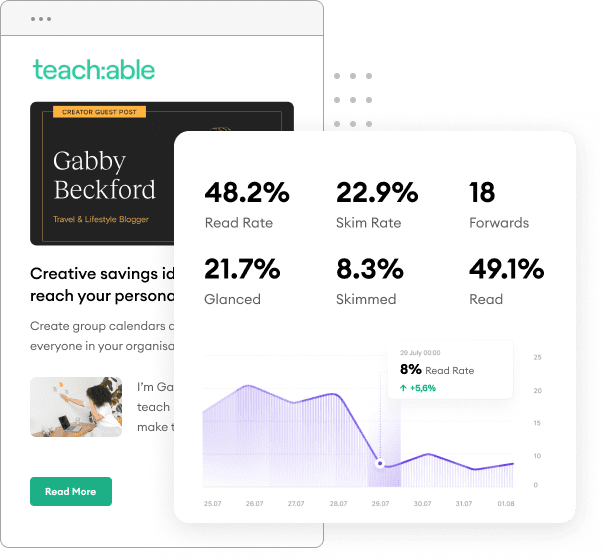In today’s fast-paced digital landscape, marketers are constantly juggling multiple tasks—from brainstorming content ideas to publishing across various platforms. With the sheer volume of work involved, it’s easy to feel overwhelmed and stretched thin.
That’s where content marketing automation comes in, offering a way to simplify and streamline your workflow.
By leveraging the right tools, you can automate repetitive tasks, optimize your content distribution, and focus more on strategy and creativity. Whether you’re looking to enhance your editorial calendar management, streamline your social media posting, or automate email campaigns, we’ve curated 9 content marketing automation tools to help you work smarter, not harder.
Content marketing automation relies on software tools to streamline and automate your day to day workflow of tasks.
Marketing automation tools help companies save time (and resources) by managing tasks like scheduling out social media posts, optimizing headlines, and curating content for your newsletters.
It’s an absolute lifesaver when you realize that you’ve spent half a day or more each week doing repetitive work that has to be done…but also feels like a waste of time when you have a thousand other things to do. (Anyone else tired of spending hours copy+pasting snippets of content, tweaking it slightly, and then reformatting it all to fit into your email newsletter?)
With these tasks automated, you can free up your time to focus on creating high-quality content and strategies that resonate with your target audience.
There are some obvious and strategic benefits of introducing automation to your content marketing, including:
Automation is a tool, not a solution.
And by that, I mean that adding automation into your workflow is only helpful when you can pinpoint the shortcomings of any given tool and have a plan in place to ensure that you’re able to maintain a fluid, human approach to your marketing efforts, even when the automation allows you to be mostly (or fully) hands off.
Here are the top 2 challenges that typically come into play
Automation software is both predictable and impersonal. Great when you’re a brand that wants to rely on a tool to do what it’s told, when it’s told to do it.
This having been said, you don’t want the end user to feel like the content they receive comes from a robot.
Take time to consider the customer journey and leverage automation to address each user journey in an appropriate way
Just because you can automate and scale something doesn’t mean you should.
Rather than increasing the volume of your efforts with automation, look for ways to increase the quality and personalization of all content that goes out, whether through blogs, newsletters, or social.
There are so many great tools out there, how do you strategically pick the right ones to ensure that it’s a smart investment for your team? Here are a few of the top considerations that I think through whenever I’m adding to my tech stack:
Most products come with a price tag. The question to ask is whether the ROI or outcome of using the product is worthwhile.
This ROI isn’t necessarily going to be directly tied to revenue (although it can be, depending on the tool). Instead, you might want to look at things like:
For example:
Let’s say Tool A costs $50/month, and acts as an all-in-one organization and planning tool that replaces three separate free products but also includes analytics to help you better understand how successful your content marketing efforts are. In this case, the the ROI comes in the form of a cleaner process and access to analytics to use when growing and scaling your efforts.
Tool B, on the other hand, costs $300/month, and is proven to save your team members 20+ hours a month on manual work. In this case, the basic ROI is clear, when you multiply the average hourly rate of your employees/team members by twenty.
This is an obvious one, but choosing good automation software requires you to peruse a feature set and compare it against your needs and the competition.
Look for tools that offer automation of repetitive tasks, such as scheduling social media posts and sending newsletters.
Some tools are all-in-one solutions that purport to do everything within a genre (think tools like Zapier, for automation, or MeetEdgar for social media scheduling). Others offer a very specific solution for a very specific use case.
Either can be the right choice, depending on your specific team and needs.
Tech stacks work best when they work together. And while there might be some duct-tape automation tools like Zapier or Automatie.io, native integrations typically stand out as a superior (and more reliable) solution to ensuring that your tools talk to each other.
Think through the hand off process, and how easily you might be able to move content from one platform to the next when you’re adding something new into the mix.
Wondering if the company is reputable? Online reviews are incredibly valuable when it comes to evaluating the effectiveness of any given software app or tool. Dissatisfied customers are typically fairly loud online.
Curious what success looks like for companies that use the product? Take time to peruse through reviews from other businesses that have used the tool and read case studies to understand the context of businesses that have experienced success.
Wondering if your use case is covered? Sign up for a demo to make sure your unique needs and use case is a good fit for the product.
With all that in mind, here are 9 of the top content marketing automation tools that you might use, whether you’re working on newsletters, blogs, or social strategies.

This free tool by CoSchedule helps you write better headlines by analyzing them for word balance, sentiment, and SEO value. It automates the process of optimizing headlines to increase click-through rates and engagement, which can be incredibly valuable when you’re working to optimize those email newsletter open rates.
Pricing: Free
Best For: Content creators looking to improve the effectiveness of their headlines without extensive manual testing.
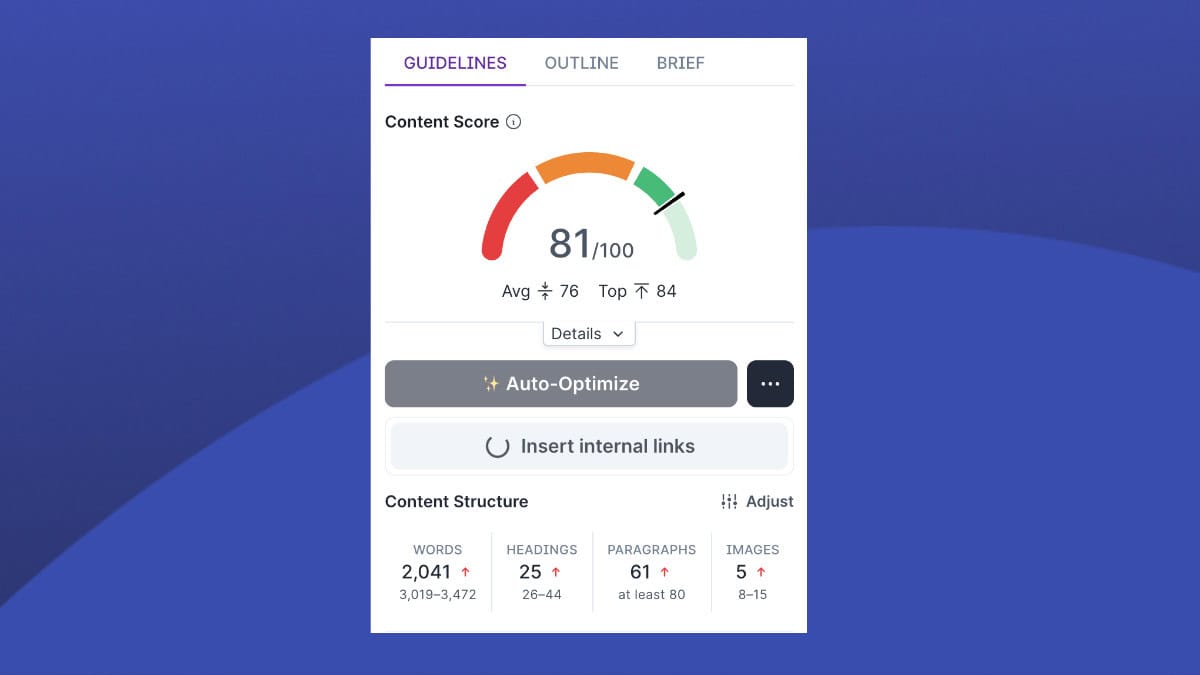
SurferSEO offers a full SEO suite, and can automate the process of creating an outline with headings that are optimized for a keyword. It also provides a helpful set of metrics to ensure that the length and depth of your blog post can compete against top ranking content for the keywords and topics that you’re focusing on.
My favorite part is its ability to insert relevant keyword variations and internal into a blog post…which is honestly such a relief when you’re focusing on creating high-quality, fully optimized content for your site.
Pricing: Starts at $89/month
Best For: Content creators looking to publish highly optimized, SEO-focused blog content.
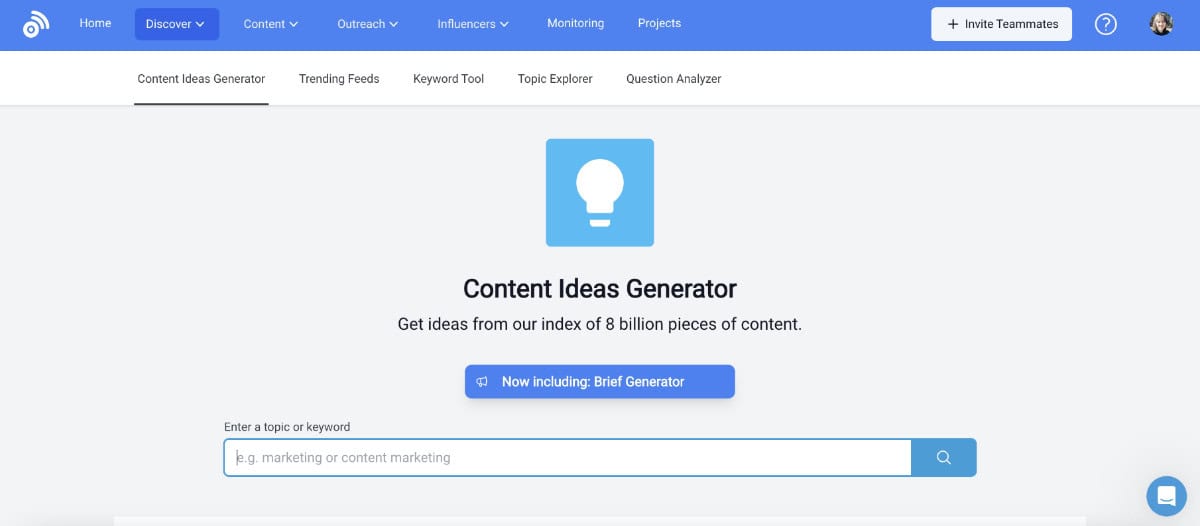
BuzzSumo helps you discover the most popular content and influencers in your niche. It automates content research by providing insights on what’s trending, allowing you to create data-driven content strategies.
Pricing: Starts at $199/month
Best For: Marketers who want to leverage trending topics and influencer partnerships to enhance their content marketing.
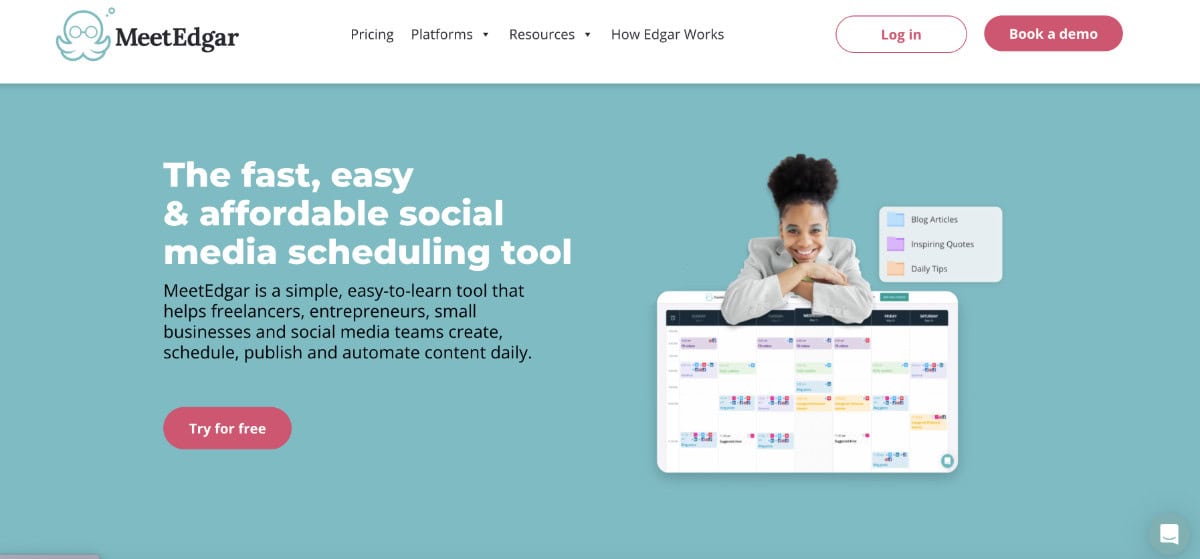
MeetEdgar is a social media automation tool designed to continuously reshare evergreen content on your social channels. It automatically recycles posts, ensuring that your content library is always working for you without requiring constant updates.
Pricing: Starts at $24.99/month (paid annually)
Best For: Businesses that want to maximize the lifespan of their social media content by automating reposts.
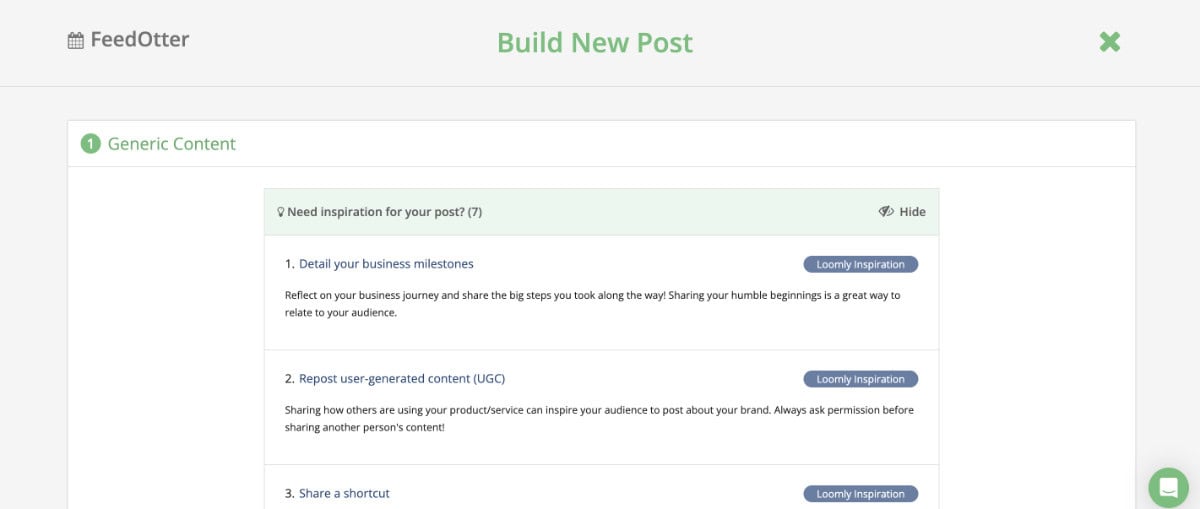
Loomly is a social media management platform that assists with content planning, scheduling, and analytics. It also provides content suggestions based on trends, dates, and social media best practices, which can be a great way to automate content ideation for various social media platforms.
Pricing: Starts at $42/month (paid annually)
Best For: Marketers looking for a tool to streamline social media planning and publishing with built-in content inspiration.
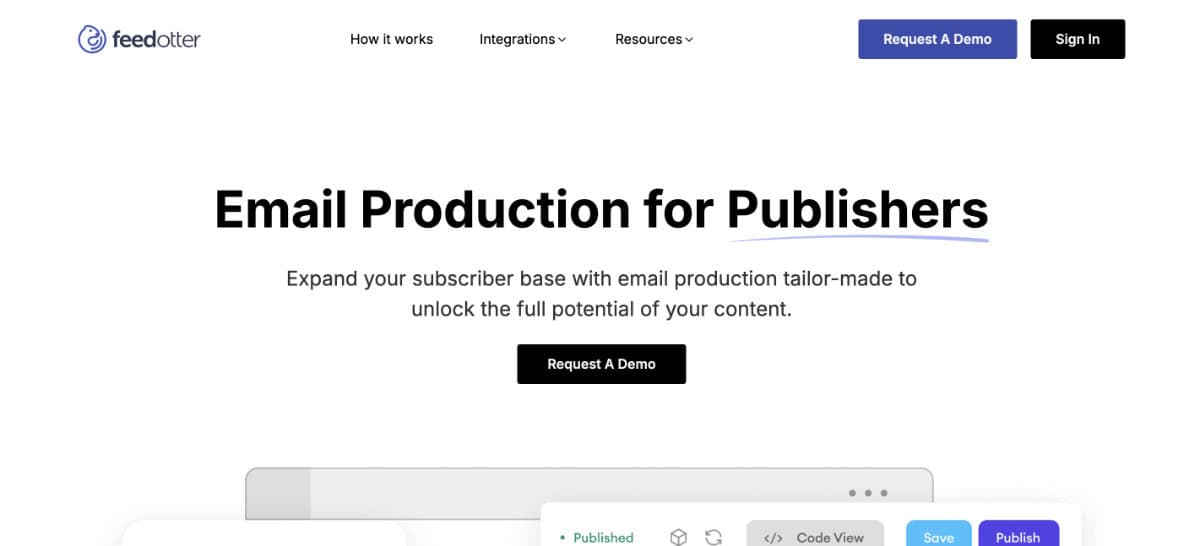
FeedOtter is a content curation and automation tool for email marketers that will automatically curate and format content for your email newsletters.
It comes with customizable templates and easy integration with email platforms like HubSpot, Marketo, and Pardot. Send out fully automated content notifications (a la Substack), or create content-rich newsletters with the latest content from your website, social media platforms, and more.
The best part: FeedOtter automatically pulls images, content, and links, and then re-formats it all to fit into your newsletter design, saving you tedious hours of copy+paste.
Pricing: The Basic plan starts $130/month
Best For: Content-driven businesses and publishers that distribute blog or news content via email.
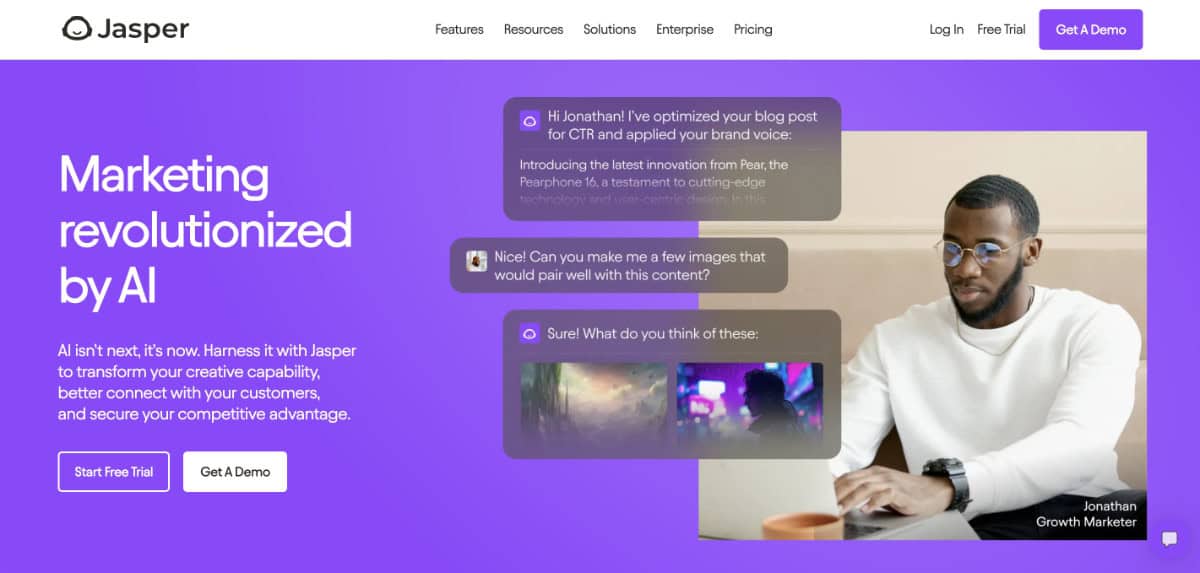
Jasper is an AI-powered content generation tool that offers a range of templates for various content types, including blog posts, social media updates, content marketing campaigns, email newsletters, and more. The AI learns from the input provided, which makes it much easier for you to train it on your brand voice without extensive prompting each time.
Pricing: Starts at $39/month
Best For: Content creators and marketing teams who need to generate large volumes of high-quality content efficiently and are looking for AI assistance to streamline their writing process.
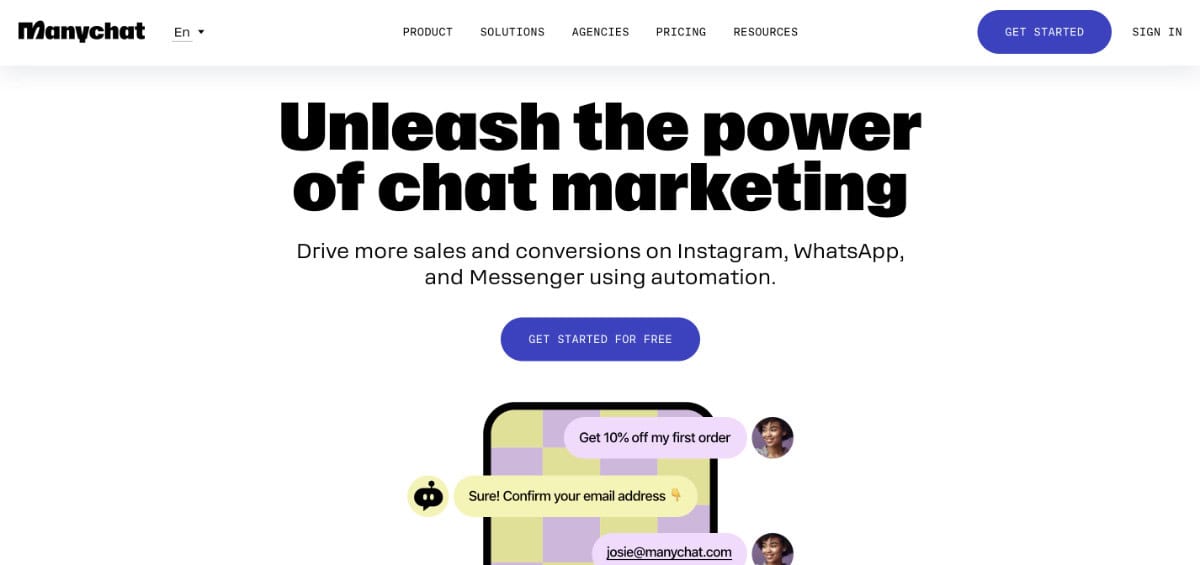
ManyChat is a chatbot and marketing automation platform for Instagram, WhatSapp, and Messenger. It allows businesses to build interactive chatbots without coding, enabling automated conversations with customers for lead generation, customer support, and marketing campaigns.
ManyChat offers drag-and-drop flow builders, audience segmentation, and integration with various third-party apps, allowing businesses to create personalized, automated experiences that guide users through sales funnels or provide instant answers to common questions.
Pricing: Free for basic features and up to 1000 contacts. Paid plans start at $15/month.
Best For: E-commerce businesses, marketers, and customer support teams looking to automate interactions and increase engagement through chatbots and messaging apps
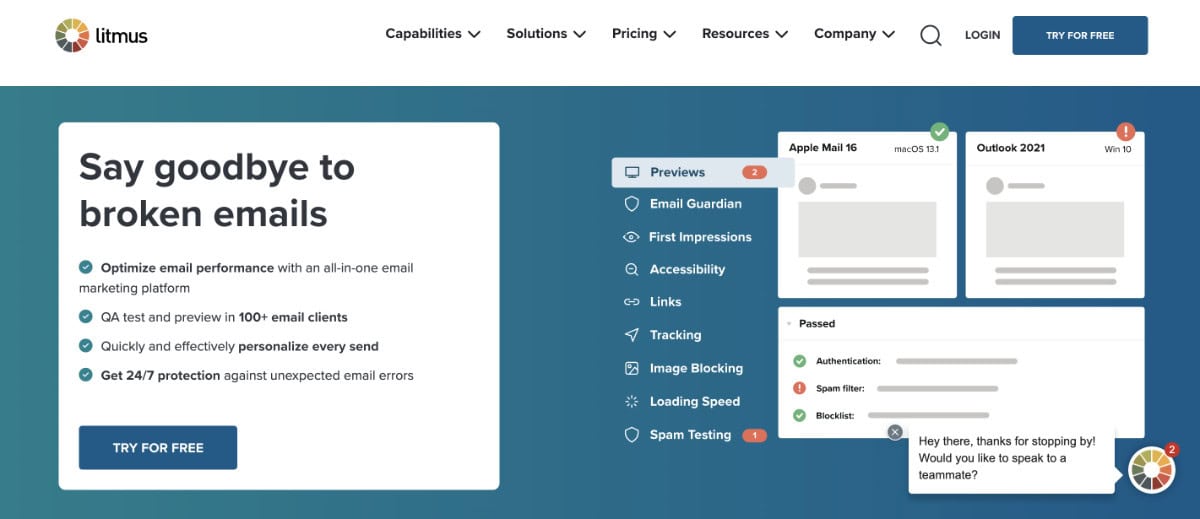
Litmus is an email testing and optimization platform. It automates the process of email previewing across multiple devices, ensures compatibility, and provides analytics to optimize performance. It also integrates with ESPs to automate the testing process within existing workflows.
Pricing: Starts at $79/month
Best For: Teams that want to ensure their emails look perfect across all devices and platforms and optimize their email campaigns post-send.
Content marketing automation involves identifying repetitive content marketing tasks and then outsourcing or automating those tasks through tools and applications. It can be applied to any phase of the content marketing process, from strategy to creation to distribution and measurement.
The goal is to help marketers and brands improve their overall content marketing strategy effectiveness and reduce burnout.
